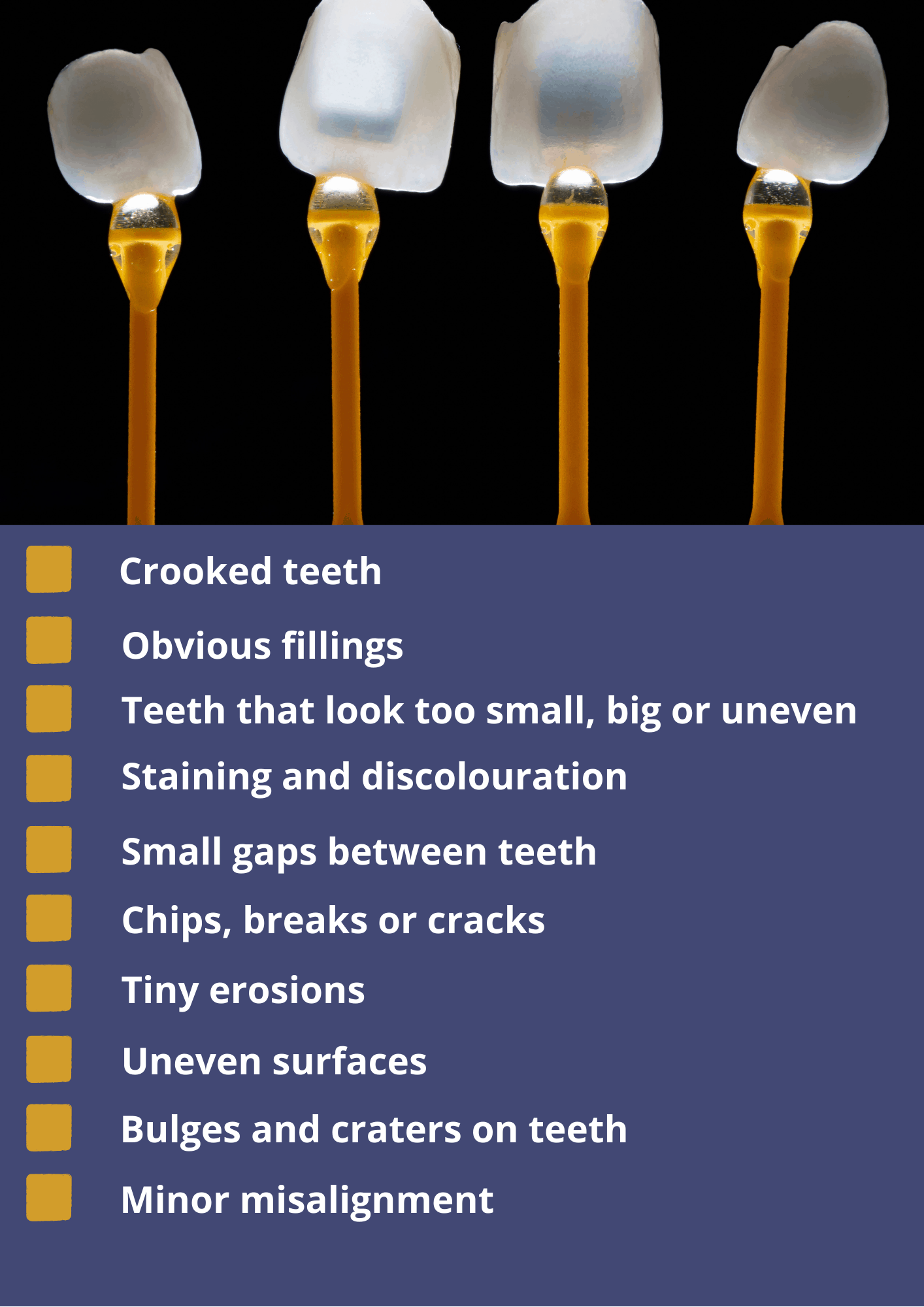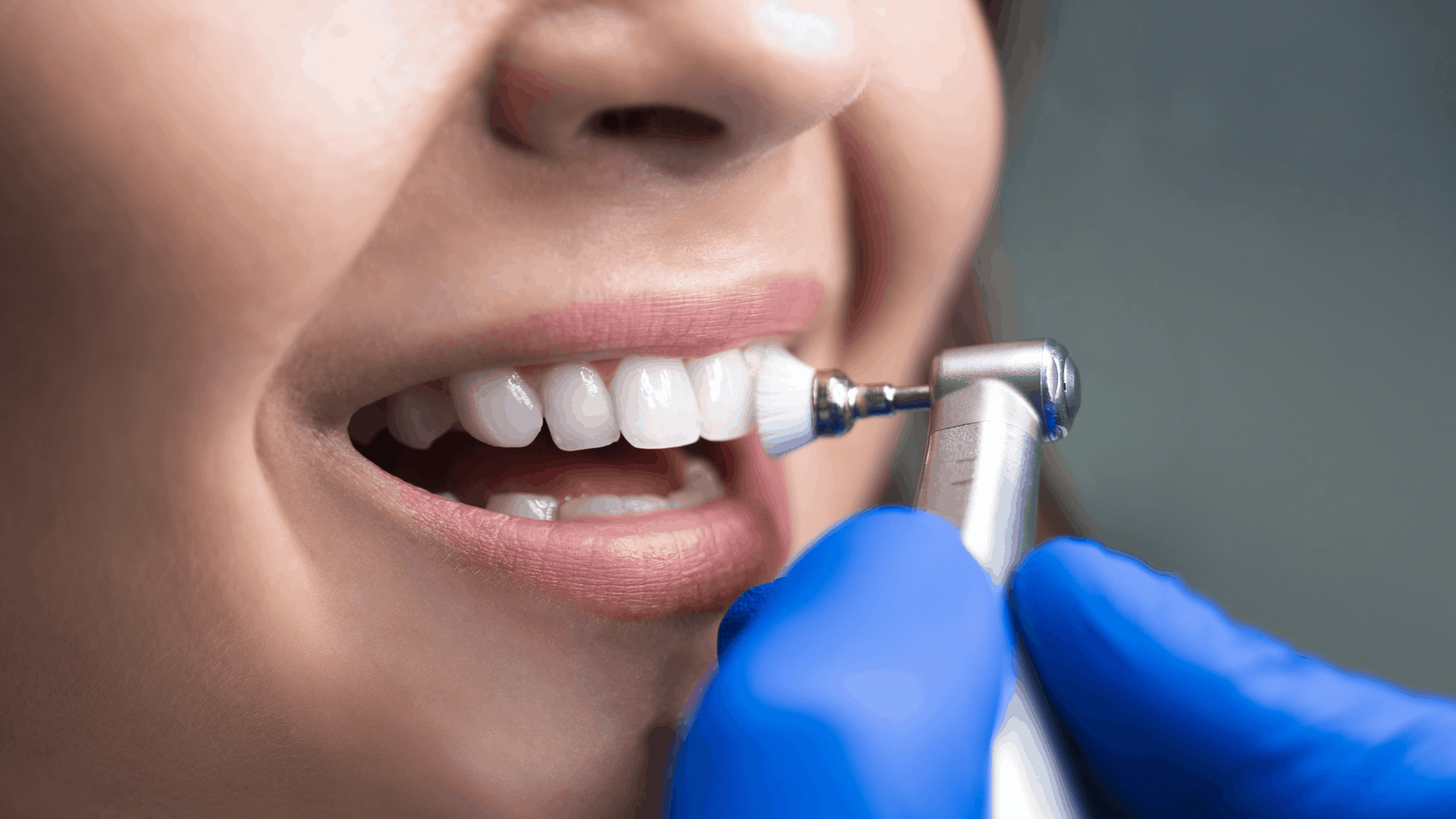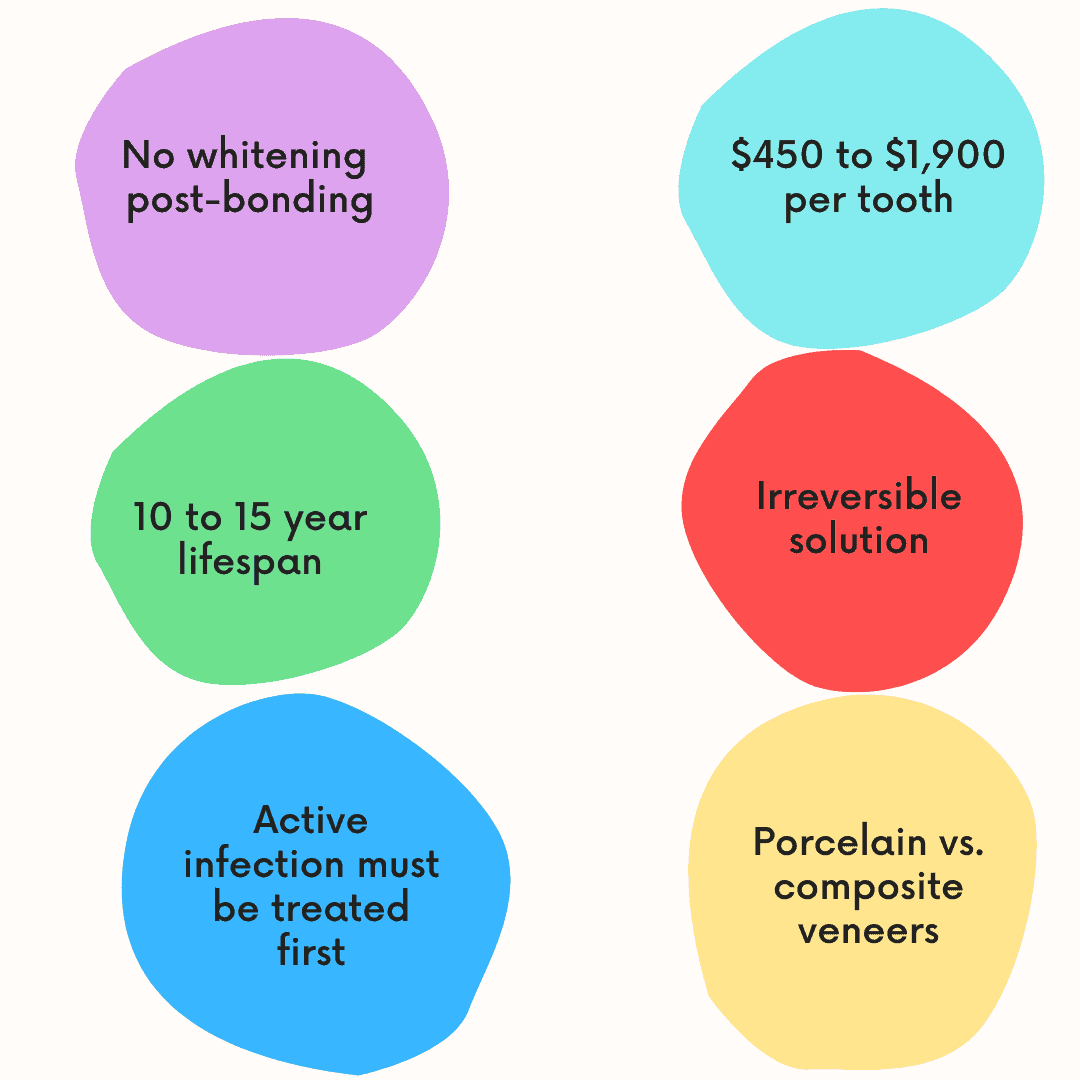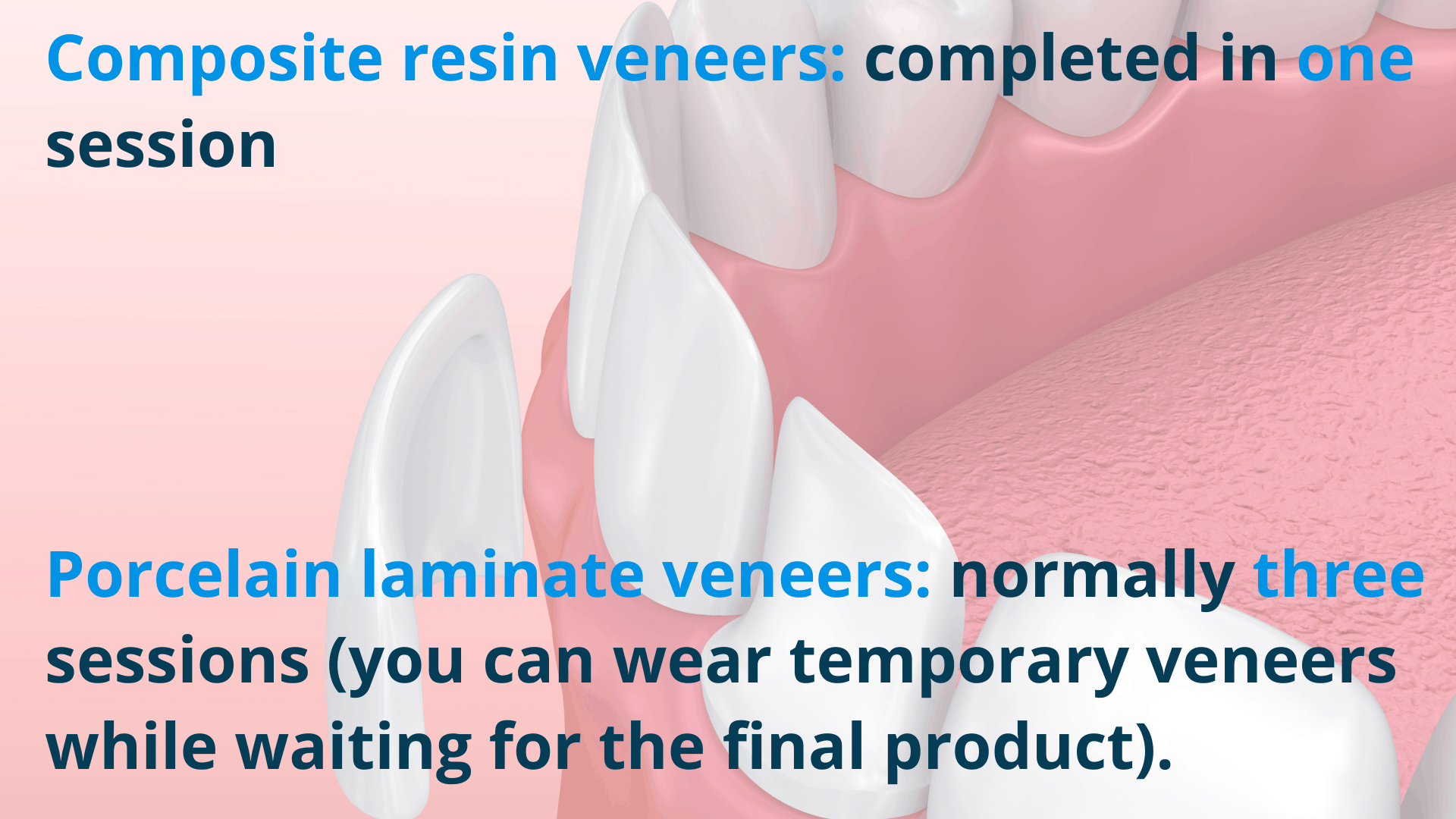If you hide your smile because of cosmetic flaws, you may be thinking about getting veneers to look and feel better when connecting with others.
This is a big investment, so it’s natural to have some concerns.
We’re often asked if veneers ruin your natural teeth.
The short answer is no. Nothing will happen to your teeth as long as you take care of your veneers – which is easy to do.
Having said this, decay can still occur if veneers aren’t installed properly, or you neglect your dental hygiene.
Keep reading to find out more about the risks of decay and how to look after your natural teeth under veneers.
But first, why might you need this procedure?
What do veneers do?
This cosmetic restoration improves your smile by creating the appearance of whiter and straighter teeth. Veneers hide minor dental imperfections, such as:
What are veneers (dental):
Veneers are wafer thin “shells” that are made from porcelain or resin composite materials.
These “shells” are permanently bonded over the front of imperfect teeth, replicating the look and feel of natural enamel. It’s hard to tell the difference; even the most eagle-eyed acquaintance won’t notice you’re wearing a covering.
This treatment can be applied to a single tooth, multiple teeth or even all of your teeth.
And one size certainly doesn’t fit all!
The shape, size and colour of veneers is customised for every patient – based on your facial features, desired look and the characteristics of surrounding teeth (particularly important if any of these remain visible).
Do veneers protect your teeth? This is part of the appeal, but it doesn’t mean you never have to worry about plaque or tartar.
Can you get cavities under veneers?
Yes, it is possible to get cavities under veneers, but only if you don’t brush and floss your teeth properly.
Although veneers add a layer of protection by isolating teeth from the surrounding environment, it’s still possible for decay to form under and around the veneer.
The usual culprit?
A diet high in sugar, coupled with poor dental hygiene.
Bacteria can also grow and spread if the veneers weren’t bonded correctly by your dentist in the first place. Please visit a reliable dentist who has plenty of experience installing veneers.
How to clean veneers and protect your teeth
The best way to protect your teeth is to take care of your veneers.
This means brushing twice a day for two minutes each time, and flossing on a regular basis. Read this handy guide to learn more.
It’s fine to use a manual toothbrush, but electric toothbrushes tend to give better access to hard-to-reach areas.
Other tips:
- Grinding your teeth can damage veneers, leaving you more susceptible to decay. Your dentist can speak to you about alternative treatment options, or give you a splint or retainer to wear at night.
- Avoid hard, tough or sticky foods (such as raw vegetables, nuts and brittle lollies). Reduce consumption of foods and beverages that could stain teeth (berries, coffee, wine and tomatoes).
- If you consume any products that could leave a stain, be sure to rinse your mouth well.
- Don’t use your teeth as a tool to open bottles, chew on ice, bite your nails and similar activities.
- Visit your dentist every six months for a thorough cleaning session that removes any built-up tartar.
- Never play contact sports without wearing a mouth guard.
What else do I need to know about veneers?
- Veneers can’t be lightened after installation: If you’re only getting veneers on particular teeth and want a brighter smile, make sure you whiten all your teeth first. Teeth whitening treatments aren’t effective on veneers. The veneers can be customised to match your freshly whitened teeth, before the procedure.
- Extend the lifespan: Porcelain laminate veneers usually last for 10 to 15 years before they need to be replaced. The better you care for them, the longer they last. Some clinical studies report higher survival rates – even 20 years. In the event of any accidental breakages, the prosthetic can be rebonded or replaced before the end of its lifespan. Visit your dentist right away to prevent any damage to your enamel or the root of your tooth.
- There’s no going back: This is a lifetime commitment, so only go down this path if you’re looking for a permanent solution. A thin layer of enamel is usually removed from your natural teeth to comfortably accommodate the veneers, so the treatment is irreversible.
- Porcelain vs. composite veneers: These are the two most popular types, each with its own advantages and possible drawbacks – depending on the circumstances of each patient. For example, composite veneers are more affordable but less durable. Porcelain veneers have a longer lifespan but the treatment sessions take longer too. Read more about the differences here.
- Multiple factors influence pricing: Porcelain or ceramic veneers usually cost between $1,700 to $1,900 per tooth. Composite veneers are cheaper, around $450 to $700 per tooth. Part of the treatment may be covered by private medical insurance, depending on your level of coverage.
- Veneers aren’t suitable for everyone: there are alternative treatments for patients with active gum disease or badly damaged teeth.
What to expect when getting veneers
The general stages:
- Initial clinical examination: a digital x-ray detects any traces of infection or disease in your teeth or gums. This will be treated by a dental hygienist or periodontist before veneers can be considered. If you need dental implants, get them before veneers.
- We evaluate your smile to determine the colour, size and shape of the final product.
- Thinking about whitening your teeth? Do it now, before the procedure.
- At Mona Vale Dental, you can PREVIEW the final result and suggest any changes so you get exactly what you want. We do an accurate digital mock-up, before creating your veneers. Think of this as taking your dream smile for a test drive, so you don’t have any regrets. Not many Australian clinics offer Digital Smile Design, but we do.
- For porcelain veneers, the final design is constructed in a laboratory (this may take a few weeks). Temporary veneers can be worn in the meantime. There’s no need for this step if you’re getting the composite option.
- The actual procedure: teeth are disinfected, a thin layer of enamel is removed and dental cement bonds the veneers to teeth. Local anaesthetic numbs the area to minimise pain.
- There will be a follow-up appointment three to four weeks after the procedure, to check your progress and healing.
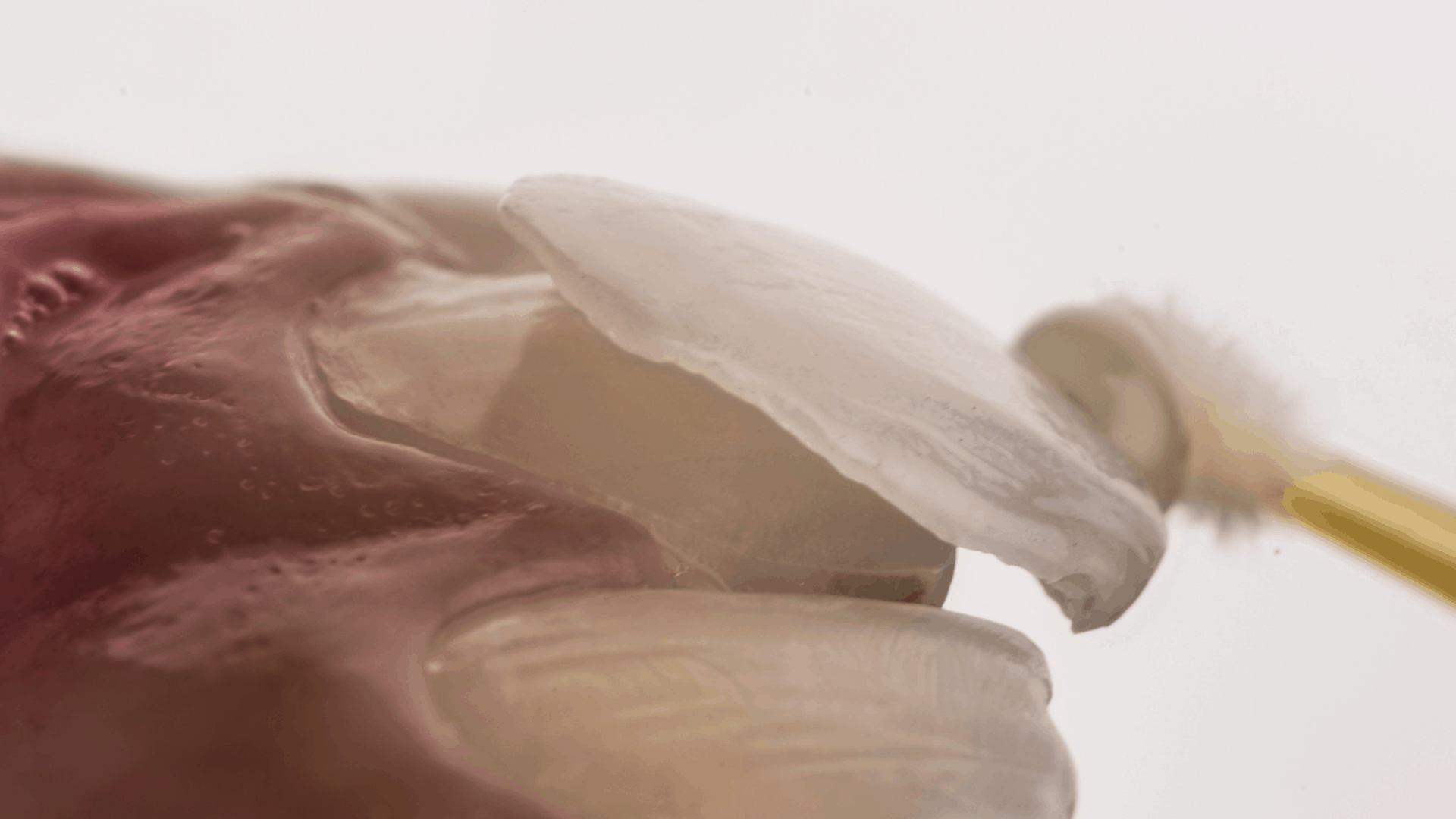
What about throbbing pain after veneers?
Some patients experience bonding sensitivity, as their teeth react to the bonding agent. This can cause throbbing pain for around six hours after the anaesthetic fades. You may also experience waves of dull pain for a few days after the procedure, which can be eased with over-the-counter pain medication.
Mona Vale Dental offers both porcelain and composite veneers
Our experienced team has been helping patients from the Northern Beaches to feel good about their smiles for more than a decade. Dr Alistair Graham will customise your veneers to suit your face and preferences. Call us on 02 9997 1100 to book an appointment or find out more.


